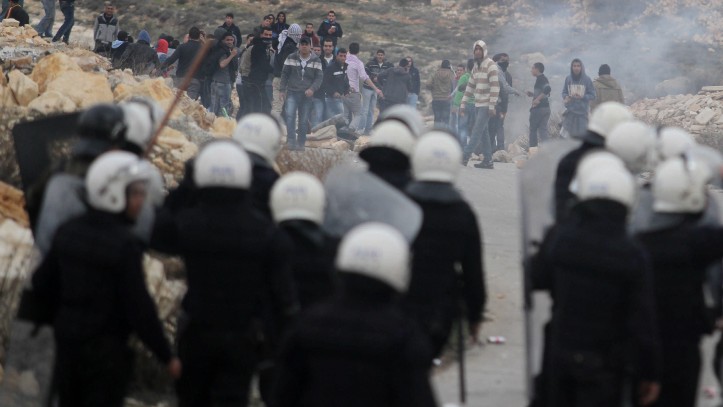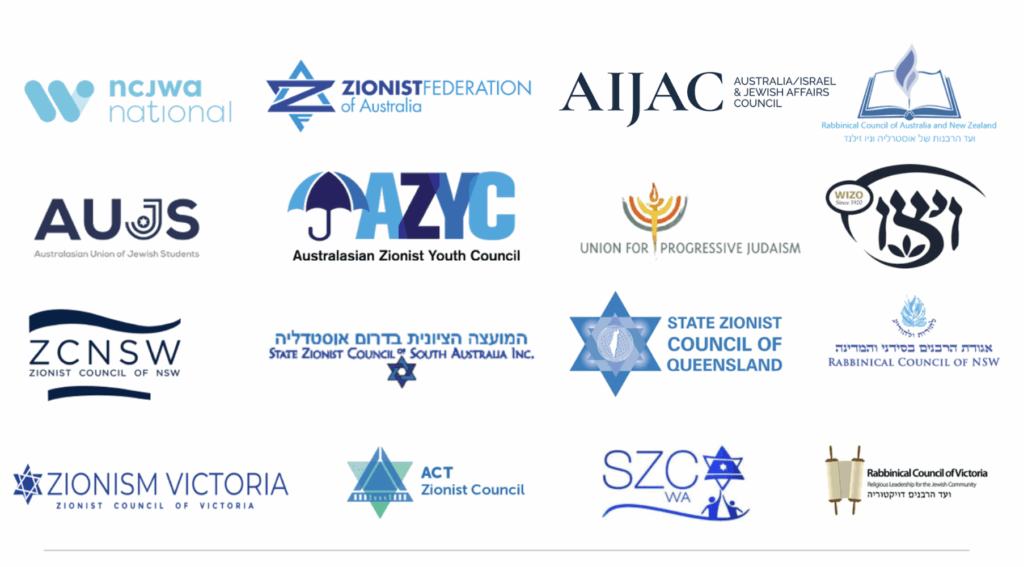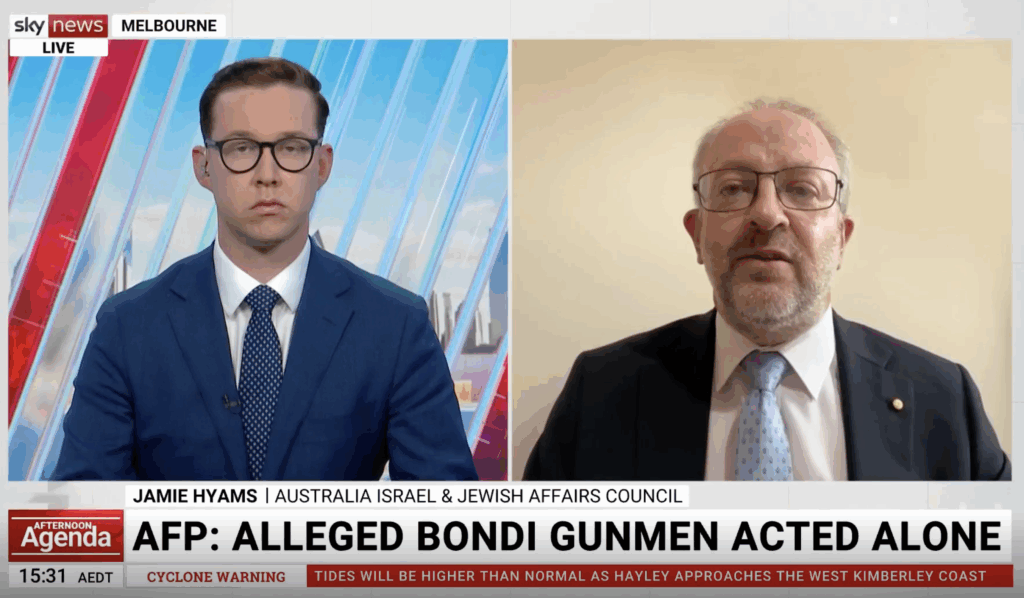UPDATES
UN strikes expose Palestinian internal tensions
January 24, 2014 | Daniel Meyerowitz-Katz

Daniel Meyerowitz-Katz
To those who follow events in the West Bank, the reports coming out of the “refugee camps” administered by the United Nations Relief and Works Agency for Palestine Refugees in the Near East (UNRWA) would sound quite familiar. For example, Times of Israel reporter Adiv Sterman wrote earlier this month that:
According to the Palestinian news agency Ma’an, main roads near the al-Jalazun and al-Amari refugee camps were blocked with stones and burning tires.
A … police spokesman said 40 policemen were injured after stones were hurled at them. The police responded by throwing stones and firing tear gas canisters at the protesters, injuring more than 10 protesters, Reuters reported. Live ammunition was reported to have been fired in the air at the site as well.
… security services spokesman Adnan Dmeiri denied that any protester was hurt, Ma’an reported.
“What happened was unfortunate, and we are with the protests and the demands and consider them lawful,” Dmeiri said.
Indeed, the image of the refugees throwing stones at police and receiving tear gas in response has to some extent defined Israeli/Palestinian relations at least since the eruption of the First Intifada in 1987.
This incident however, has one caveat. Adnan Dmeiri does not work for the Israeli security services, he works for the Palestinian Authority. The police who were firing tear gas at, and apparently lobbing rocks back at, the protestors were PA police.
The recent clashes can be attributed to the divisions between the “refugees” and the rest of the Palestinian population in the West Bank. They were sparked by an ongoing strike by UNRWA employees, who have suspended services to protest a number of recent budget cuts and layoffs.
It is fitting that UNRWA is at the centre of the whole debacle, as it is UNRWA which is predominantly responsible for the underlying issues. That is because the “refugees” to whom it caters are not refugees in the conventional sense of the term. As explained in more detail here, the more aptly named “Palestine Refugees” fall under a separate system to the other refugees in the world, with its own criteria for qualification.
So whilst a refugee generally must be outside their country of previous residence and unable to return there because of persecution, Palestine Refugees must merely have either fled their homes during the 1948 war between Israel and the Arab states, or be descended from someone who fled. The Palestine Refugees living in the West Bank would never have qualified as conventional refugees. As they fled their homes but crossed no international borders, they would have been classified as “internally displaced” only. Further, as the West Bank was then annexed by Jordan and they were afforded Jordanian citizenship (which in some cases was later revoked), even if they were refugees and not internally displaced, their refugee status would have been lost.
Unsustainable solutions
The most significant distinction between Palestine Refugee status and refugee status under the Refugee Convention — which came into being two years after UNRWA had been established — is the focus on solutions. The UN High Commission for Refugees (UNHCR) aims to provide refugees with one of three sustainable solutions: repatriation to their original nation; integration into the country to which they fled; or resettlement to a third country. Palestine Refugees, however, are denied the latter two. The only solution presented to them is repatriation, which is a practical impossibility as Israel simply cannot afford to take in all five million of them.
Yet thanks to years of propaganda from Arab leaders, the dream of return has become so entrenched in the Palestinian mindset that it is all but impossible to relinquish. In a report on the UNRWA strikes, New York Times reporter Isabel Kershner had a revealing conversation with one Palestinian woman:
Asked about a solution for the refugee problem, Mrs. Abd al-Razzaq laughed and said: “It is impossible to return.” But she added: “We insist on return. We don’t want to give up our rights. We will leave it for the generations to come. We don’t want our grandchildren to say we sold out the land.”
When this refusal to compromise on the demand of returning to their pre-1948 properties is combined with the hereditary nature of Palestine Refugee status, the high Palestinian birth rate, and the refusal of the surrounding Arab states to integrate their Palestinian residents into their general populations, the result is a ballooning population.
UNRWA essentially functions as a welfare agency for registered Palestine Refugees. This means that as their population continues to expand, the Agency has found itself under increasing financial stress. Last year there was a $65 million shortfall out of UNRWA’s $675 million annual budget.
As Ha’aretz reporter Amira Hass notes, what little the PA did to help the Palestine Refugees was recently scrapped due to its own budget pressures:
When Salam Fayyad was Palestinian prime minister, he earmarked modest funds to the various camp services committees. Among other things, these were aimed at repairing basic infrastructures. But at the end of his term last spring, the special budget was cancelled due to the PA’s financial difficulties
But whom to blame?
Also apparent from Hass’ reporting is the extent to which the Palestinians are being taught to blame the Palestine Refugees’ situation not on the Arab leaders or the PA, but on Israel:
“Since 1948, the refugees have been feeling betrayed by everyone,” says Dr. Adel Yihye, an anthropologist and native of the Jalazun refugee camp, who has published a number of studies about life in the refugee camps.
“The essence of being a refugee is betrayal,” he says. “You were betrayed, you were a victim and nobody takes any notice of you. That’s a central part of the refugees’ psychology.”
The Palestinians see Israel as chiefly responsible for the refugee problem, but the refugees’ disappointment with the Palestinian Authority is especially great, Yihye says, because “they had expectations of the PA.” …
The Palestinians see the international community’s contributions to UNRWA as natural and just, since the community is directly involved in creating the problem having supported the establishment of the State of Israel back in 1948.
Without publicly admitting it, the PA and UNRWA are competing for the international community’s donations. Both depend on those states’ generosity, their economic situation and political desire.
In reality, however, Israel is not the primary cause of the ongoing plight of the Palestine Refugees. As Commentary‘s Jonathan Tobin points out:
The curious thing about the dispute between the refugees and the PA is that while the former demand that the corrupt Palestinian government take care of them while UNRWA is on strike, they are resolutely against being governed by it. Doing so would mean giving up their special status as refugees and taking up the more prosaic identity of Palestinian Arabs living on the territory of the putative independent Palestinian state …
The fault for this decades-long scandal lies principally with the Arab states. Not one has sought to absorb the refugees created by the war of aggression launched by the Arab world against the new Jewish state in 1948. Worse than that, the refugees were not allowed to leave the camps and denied the opportunity to acquire citizenship in any of the Arab countries in which they resided. That was also the case with Egypt and Jordan, the nations that governed, respectively, Gaza and the West Bank from 1949 to 1967 when the Arab and Muslim world refused to advocate the creation of a Palestinian state in those territories. Instead, their goal was to eradicate the Jewish state that existed inside the truncated borders created by the 1949 armistice agreements that ended Israel’s War of Independence.
Another tragedy in this sorry saga is the extent to which UNRWA and other UN agencies are complicit in these efforts to entrench the Palestine Refugee situation. As Rutgers Professor Michael Curtis points out, UNWRA officials can often be found touting the standard anti-Israel narrative. UNRWA also embraces — or at least refuses to oppose — some of the less savoury practices of the PA and Hamas, such as teaching hatred through school textbooks and naming sporting facilities after murderers and terrorists.
It is no wonder then that prominent individuals such as Curtis and Canadian MP Irwin Cotler have been calling for UNRWA to be abolished. There may be some wisdom in this given that, as Hass noted, the PA is essentially in competition with UNRWA for international aid money. It seems far preferable for the international community to be sending its aid to one organisation that is responsible for Palestinians in the Middle East, rather than maintaining the status quo, whereby Palestine Refugees have different rights and privileges to other Palestinians. Meanwhile, in accordance with the demands of both Cotler and Curtis, the few Palestine Refugees who would qualify for conventional refugee protection should be placed under the care of the UNHCR like every other refugee in the world.
Tags: Palestinians





